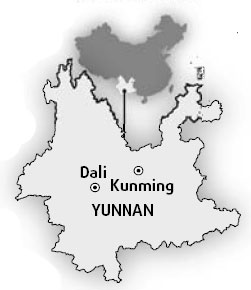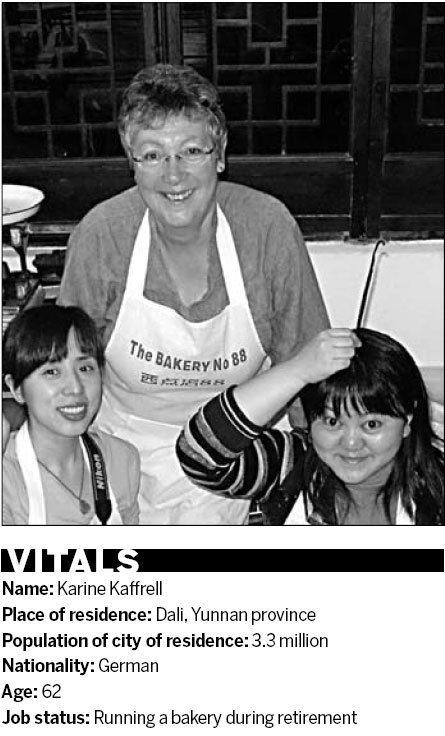Going local in melting pot of minorities
EDITOR's Note: "Home & Away" is a section about the life experiences of expats living outside of the major metropolises like Beijing and Shanghai. If you are such an expat and have an interesting story to share, please send an e-mail to expat@chinadaily.com.cn.
German Karine Kaffrell says she doesn't feel like a foreigner in Yunnan province's ethnically diverse Dali Bai autonomous prefecture.

"So many ethnic minority groups live and work together here - Bai, Yi, Hui, Naxi, etc - that I get the feeling the locals simply think of us laowai (foreigners) as just another minority," the retired chemical engineer says.
The 62-year-old and her compatriot husband have spent the last seven years in the melting-pot settlement of about 3.3 million people near China's border with Myanmar. She says there are many things about the city that make it an ideal place for the couple to spend their retirement.
"Dali is a small city in the mountains with great landscape, a perfect climate and an interesting population," she says.
Kaffrell opened Bakery 88, which emphasizes the use of local organic ingredients, to provide employment for local women. In addition to learning how to make breads, cakes and pastries, the business also helps its 10 employees improve their English and cultivate other life skills.
"Every day at work is a new challenge," Kaffrell says.
Having stayed in China on and off since 1986, including a two-year stint in Jiangsu province's Suzhou city in 1992, the couple has become very accustomed to life in the country's smaller cities.
"While there are little culture shocks now and then, the big one happened a long time ago," Kaffrell says.
"The time we spend with friends is not that different from in the West - sharing small daily problems, chatting and being involved in family activities like marriages."

She describes her Mandarin as "OK" and says she can understand some of the local dialect, which has made it easier for her to become part of the community.
Kaffrell explains that it has become rare for other residents to stare at her or start random conversations with her, largely because "most locals know me". Also, the bakery is located on Yangren (Foreigner) Street in Dali's ancient city district - a stretch of bars, restaurants and cafes occupying traditional Bai-style buildings that is toward the top of most foreign tourists' itineraries.
The German says that because she and her husband have lived in the area for so long, they are often invited to participate in festive occasions, the most fascinating of which was a rural Muslim wedding. But they sometimes host such events, too, such as a housewarming party in which they invited 50 guests and 100 showed up.
Their modern home is located on a mountainside just outside of the city, with a great view of the scenic Erhai Lake. Kaffrell and her husband spend most of their free time hiking over the mountains surrounding their house, some of which rise to 4,500 meters, she says.
The Germans agree they have little interest in living in the country's major metropolises.
"Sure, it's easier to find baking ingredients and other supplies in the big cities, but I would never want to move there, because life in Dali is more laidback," Kaffrell says.
China Daily

(China Daily 06/15/2010 page8)














